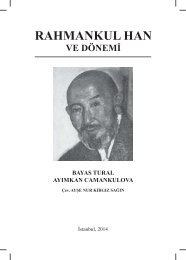THE SOVIET HISTORIOGRAPHY AND THE QUESTION OF KAZAKHSTAN’S HISTORY
SOVYET-TARIH-YAZICILIGI-ENG
SOVYET-TARIH-YAZICILIGI-ENG
You also want an ePaper? Increase the reach of your titles
YUMPU automatically turns print PDFs into web optimized ePapers that Google loves.
188<br />
<strong>THE</strong> <strong>SOVIET</strong> <strong>HISTORIOGRAPHY</strong> <strong>AND</strong><br />
as – “turok” and “turetskiy”; and Russian Turks as – “türok” and “türksiy”<br />
to demonstrate that these two populations had no connection.<br />
The prohibition of studying Golden Hordes’ history continued almost<br />
until the time of the USSR’s decay. At that time, especially in the Tatar<br />
Autonomous Republic, studies about the subject started to reappear.<br />
It can be more likely said that today a significant progress has been<br />
made. Almost all of resources on the subject of Golden Horde have<br />
been released as well as many researches on the political, economic,<br />
state organization and socio-cultural history of Golden Horde have<br />
newly been published. The Golden Horde Researches Institute founded<br />
under the auspices of the Şihabeddin Mercani History Institute hosts<br />
an International Golden Horde Symposium every year and publishes<br />
periodical journals called “Golden Horde Review”, “Zolotoordınskaya<br />
Tsivlizatsiya (Civilization of Golden Horde)” and “Numismatics of Golden<br />
Horde”. More recently, even in Russia itself some historians look<br />
more positively at Golden Horde than before. However, the number<br />
of scholars who still hold the old negative perspectives is still high.<br />
But, the actual important thing is to consider is that the history books<br />
for schools and students of the non-Russian populations, such<br />
as Golden Horde, interpret the history objectively. Otherwise, this<br />
issue has a potential to cause enormous problems over the long run<br />
in Russia where more than 100 ethnic groups live.<br />
BIBLIOGRAPHY<br />
Acar, S., “XVI. Yüzyıl Türk-Tatar Tarihinin Mühim Bir Kaynağı: “Kazanskaya<br />
İstoriya”, Karadeniz Araştırmaları, No. 33, 2012, pp. 35-42.<br />
Alişev, S. H., “Izvraşenie i Falsifikatsiya Istorii Tatar v Russkoy Istoricheskoy<br />
Nauke”, Tatarskiy Narod Posle 1552 Goda: Poteri i Priobreteniya, Kazan<br />
2003, pp. 235-240.<br />
Caferov, T., XV-XVII. Yüzyıl Rus Edebiyatında Türkler, (translation. N. Abdullayev),<br />
Atatürk Kültür Merkezi Press, Ankara 2010, pp. 23-46.<br />
d’Encausse, H. C. Tamamlanmamış Rusya, (Translation. R. Uzmen),<br />
Ötüken Press, İstanbul 2003.<br />
Edigey Destanı, (Prep. by R. Sultî), Türksoy Press, İstanbul (t).<br />
Frank, A. J., Islamic Historiography and “Bulghar” Identity among the Tatars<br />
and Bashkirs of Russia, Brill Acedemic Pub., Leiden-Boston 1998.<br />
Galstyan, A. G., Ermeni Kaynaklarına Göre Moğollar, (Translation İ. Kamalov),<br />
Yeditepe Press, İstanbul 2005.<br />
Galstyan, A. G., Armyanskie İstoçniki o Mongolah, İzvleçeniya iz<br />
Rukopisey XIII-XIV Vekov, İzdatelstvo Vostoçnoy Literaturı, Moskva<br />
1962.



